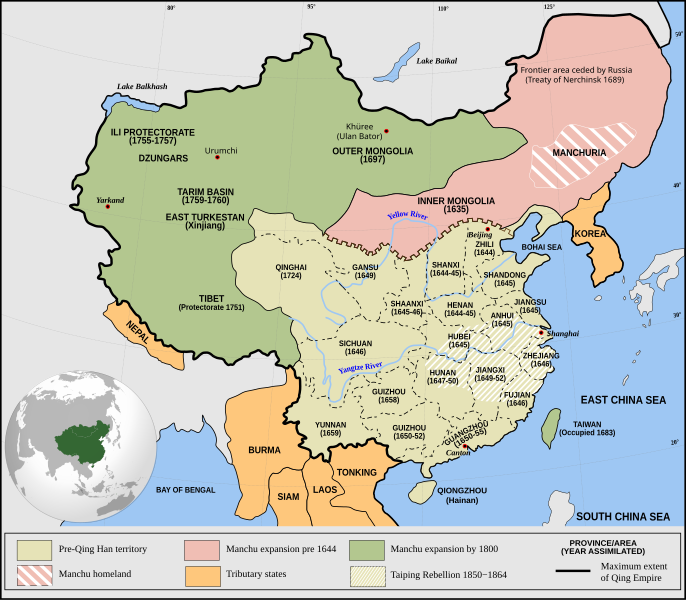World War Two is the deadliest war in human history by a long shot (and hopefully it will remain that way). Estimates vary massively, but many agree up to 80 million people died in the global conflict as a result of armed battles, city-wide bombings, sieges, starvation, disease, genocide, massacres, and the only use of nuclear weapons in wartime.
Along with the Soviet Union, one of the hardest-hit countries was China, which lost up to 20 million people in the war, a huge chunk of which were civilians. Remarkably, China was also struck by what’s been called the bloodiest civil war in human history less than a century before the guns of WW2 fell silent: the Taiping Rebellion (1850 to 1864).
Once again, concrete estimates are difficult to come by, given the messy nature of war, but historians suspect that over 20 million people may have perished in the war, roughly 5 percent of the empire’s population and nearly 2 percent of the global population.
What caused the Taiping Rebellion?
The Taiping Rebellion was essentially an uprising against the ruling Qing dynasty led by Hong Xiuquan, the self-proclaimed younger brother of Jesus Christ. He had established the Taiping Heavenly Kingdom in southern China, which attempted to replace Confucianism, Buddhism, and Chinese folk religion with a unique brand of Chinese-infused Protestant Christianity.
“The Taiping was a massive millenarian rebellion led by a frustrated scholar of peasant background, Hong Xiuquan. Hong’s fanatical visions merged with a rudimentary understanding of Christianity to inspire a movement seeking to bring about the Kingdom of God on earth,” Elizabeth J. Perry, a political scientist who specialized in Chinese politics and history, wrote in a 1980 paper.
The conflict also played into the complex ethnic tensions between the Qing dynasty, led by the Manchus, and the Hakka (a Han Chinese subgroup to which Hong belonged), as well as the Zhuang.
The Qing Dynasty reached its peak in the 18th century, but the following century was less fortunate. The sprawling empire was struggling to feed its booming population, leading to hunger and famine, while many were put out of work due to a labor surplus. Meanwhile, the Qing elites became increasingly decadent and corrupt, hoarding public funds and continuing to rake in high taxes from the struggling population. All of these themes are classic symptoms of societies on the brink of collapse.

A map of China in the 19th century.
To make matters worse, European powers were becoming an increasingly meddlesome threat. The British Empire essentially flooded the country with opium, leaving the population hooked and downtrodden, not to mention humiliated by the two Opium Wars.
It was a recipe for disaster. As this was going on, the seeds of Protestant missionaries from Europe started to sprout and gave rise to the God Worshipping Society, a Christian religious movement founded and led by Hong.
They existed as a kind of armed militia in the late 1840s, attracting the help of peasants, workers, and miners who were disgruntled by the Qing dynasty. The group managed to establish a large presence across significant portions of southern China by 1850, at which time they began to be persecuted by local officials and violence started to erupt.
Following several clashes with agents of the Qing Dynasty in 1850, the war fully kicked into gear in 1851 when Hong declared himself the Heavenly King of the Heavenly Kingdom of Peace and attempted to overthrow the Qing Dynasty.
Why was the Taiping Rebellion so deadly?
China is no stranger to bloody wars. On top of WW2 and the Taiping Rebellion, the East Asian behemoth has witnessed many of the world’s deadliest conflicts, including the Lushan Rebellion, the Three Kingdoms War, the Manchu Conquest of China, and the Chinese Civil War.
Simply put, China is a large country with a massive population, which is partially why the Taiping Rebellion was so bloody. The conflict also lasted relatively long for an internal rebellion – 14 years – and took place over 17 provinces, two major factors that helped to account for the bloodshed.
Some historians have also hinted that the war was so destructive because it was fueled by impassioned sentiments.
“Inspired by Christian-inflected messianic visions and fueled by social dislocation, race hate, and anti-state discontent, The Taiping War […] has been characterized as one of the most devastating wars in human history due to its staggering death toll, estimated by 19th-century Western observers as having been in the tens of millions,” historian Tobie Meyer-Fong wrote in 2015.
Furthermore, deaths by bullets, cannonballs, and muskets were just one side of the story. Along with deaths via armed combat, it’s likely that millions upon millions also died from the wider fallout of the war.
“Although the absence of accurate demographic data makes it impossible to know with any precision how many people died, the sources testify insistently to the unprecedented carnage of appalling scope and scale. The mortality figures include not only those who died in battle, but also the much larger number who committed suicide or who died as a result of having been brutalized by conscription, forced labor, starvation, or epidemic disease, or in the context of simultaneous social unrest,” added Meyer-Fong.
Source Link: You Probably Didn't Learn About The Deadliest Civil War In Human History At School